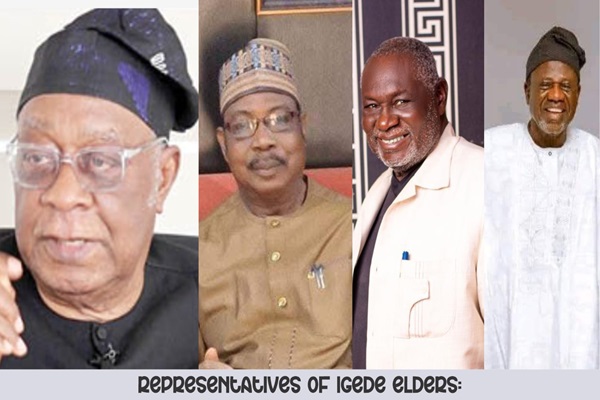A group of Igede elders, statesmen and women, opinion leaders, and elected representatives from Oju and Obi Local Government Areas have declared their support for the creation of Apa state out of Benue State. Accordingly, they have called for dialogue among relevant authorities and stakeholders to actualize the dream state.
The group, under the aegis of Concerned Igede Elders and Representatives, made the declaration at a press conference in Makurdi, the Benue State capital, on Tuesday, August 19. Led by the Coordinating Convener, Professor John Enyi, the group consists of over 50 reputable men and women drawn from the academia, civil service, serving and former elected and appointed political leadership at all levels of government who are signatories to the declaratory document unveiled at the event supporting the demand for the creation of Apa State.
Prominent among them are Prof. Ode Ojowu, former Chief Economic Adviser to President Olusegun Obasanjo; Prof. Oga Ajene, Rt.Hon Egbiri Idaah; Gen. Ede Ode, Bishop Dr. Pinot Ogbaji; Dr. Isaac Egboja; the three serving members of Benue State House of Assembly; the incumbent Chairmen of Oju and Obi Local Government Councils; and the immediate past Commissioners from Oju and Obi Local Government Areas.
In his address on behalf of the group, Prof Enyi, former Chairman of Oju Local Government Council and former Commissioner for Local Government and Chieftaincy Affairs, noted that out of the three proposed states that could possibly incorporate Igede people, namely, Apa, Apa-Agba, and Ogoja, the first two are virtually the same as they cover the same geographical location – the nine Local Government Areas of Benue South Senatorial District.
He appreciated the promoters of the proposed states because of their potential to bring government and development closer to the people. For that reason, he said, “we align ourselves with the demand for the creation of Apa State for Benue South Senatorial District out of the present Benue State. By the same token, we reject the inclusion of Igede people in the proposed Ogoja state.”
Professor Enyi explained that his group’s position on the proposed Ogoja state derived from the fact that it is based on wrong premises. One of them is the proposal to carve out the Igede people from Benue State in Northern Nigeria to join Cross River State in Southern Nigeria, a proposition the group considers constitutionally and politically not feasible. “Historically, states have never been created across regional boundaries. Secondly, the history of Igede people quoted by the promoters of Ogoja state, on which they base their desire for a reunion with their kiths and kin in Cross River State is ahistorical and, therefore, unacceptable to us.” He dismissed the allegation of marginalization of Igede people as the reason for demanding their excision from Benue state as insufficient for such a radical decision. “Real or imagined fears of marginalization exist in every human group, and these can always be rectified or resolved through sincere and constructive engagement and dialogue among parties concerned.
He, therefore , called for a meeting of relevant authorities, elders, leaders and stakeholders in Benue South Senatorial District to discuss and agree on the structural contents of the proposed state. Specifically, he identified four salient issues to be ironed out. They include the modification of the name of Apa State to include ‘Agba’ (Apa-Agba), to reflect the identity of Igede people in other to give them a sense of belonging and co-ownership; structuring of the composition of Local Government Areas in the proposed state in a ratio of 3:3:4 for Old Otukpo, Old Okpokwu and Old Oju, respectively, in order to safeguard the constitutional rights of Igede people within the context of section 179(2) a & b of the Constitution of the Federal Republic of Nigeria 1999 (as amended); structuring of the composition of Federal Constituencies in the proposed state similar to what it has proposed for LGAs; and carving the Senatorial Districts of the proposed state along the boundaries of Old Otukpo, Old Okpokwu and Old Oju.
Prof Enyi said the call for a roundtable engagement had become imperative because no such dialogue, involving the Igede people, was known to have taken place preceding the submission of the supporting documents for the demand for Apa State now before the National Assembly. “The proposed roundtable discussion will, therefore, serve as an opportunity to harmonize positions, especially on the issues raised above, ahead of the remaining constitutional processes on the creation of states.”
He emphasized that the Igede people’s desire for a new state out of Benue State was not driven by animosity, but an aspiration for improved political space and associated benefits. “Igede people are content remaining in the current Benue if new states are not created, or if the proposed new state does not meet the minimum requirements of the Igede people to join such a new state.”






